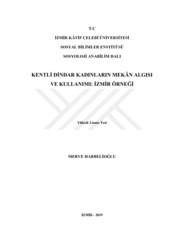Kentli dindar kadınların mekan algısı ve kullanımı : İzmir örneği
-
Eser Sahibi
Harbelioğlu, Merve
- Tez Danışmanı Muhammet Ertoy
-
Tür
Yüksek Lisans
- Yayın Tarihi 2019
-
Yayıncı
İzmir Katip Çelebi Üniversitesi Sosyal Bilimler Enstitüsü
- Tek Biçim Adres https://hdl.handle.net/11469/2569
-
Konu Başlıkları
Sosyal Bilimler - Sosyoloji
Kent Yaşamı - Kentlileşme
Dindarlık - Kent Dindarlığı
Din - İslam - Kadın
ÖZETGünümüzde göç ve kentleşme bağlamında bir taraftan kentsel mekânların yapısı, işlevi ve değişimi bir taraftan da dindarlığın ve dindarların bu değişime gösterdiği uyum veya direnç sosyolojik bir gözlemi ve dikkati gerektirmektedir. Kentte gündelik hayatın en önemli boyutunu mekânlar ve bu mekânlarda gerçekleştirilen faaliyetler meydana getirmektedir. Toplumsal etkileşim yanında hayata dair inanç ve kabullerin bu mekânlara nasıl ve hangi çerçevede taşındığı önem arz eder. Yaşam biçimlerini, toplumsal etkileşimi ve gündelik hayatın düzenlenmesini önemli ölçüde etkileyen dini inanç ve kabullerin kentsel mekân algısına ve kullanımına yansımalarının tespiti bu bakımdan sosyolojinin araştırma sahasına dâhil olur. Eğer mekânsal kısıtlamaları, sosyal yaşama mümkün olduğu kadar katılmamayı salık veren bir dindarlık perspektifine sahip değilse, dindar bir bireyin çoğunluğu seküler karakterde inşa edilmiş ve bu çerçevede işlevselleşmiş mekânlarda kendini hangi amaçla konumlandırdığı araştırmaya değer bir konudur.ABSTRACTNowadays, in the context of immigration and urbanization, in some ways of the structure of the urban space, the function and the alteration of it, on the other way the adaptation or the resist of the religion and religiousness must be required a sociological observation and carefulness. The most important dimension of the city’s daily life is created in these places and the activities which are happening in there. Beside of the social interaction, the belief and acceptance about life
it is also important that how and in which frame that is moved. In this respect, the determination of the reflections of religious beliefs and assumptions on the perception and use of urban spaces which affect the way of life, social interaction and regulation of daily life are included in the research field of sociology. If the spatial constraints do not have a perspective of religiosity that suggests not to participate as much as possible in the social life, it is worth investigating for what purpose a religious individual is located in secular character built and functionalized in this context. If the effort of legitimization also accompanies to this positioning, it is also worth questioning in which religious, communal and economic sources it is fed and produced.
-
Koleksiyonlar
ENSTİTÜLER
SOSYAL BİLİMLER ENSTİTÜSÜ

 Tam Metin
Tam Metin

